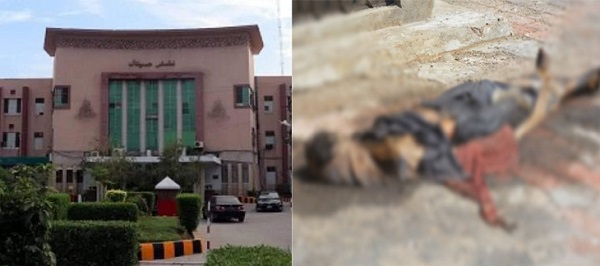(Asian independent) I sit down to write this article with a very heavy heart. On October 14, a total of 500 dead and mutilated bodies were found on the roof top and in the morgue of Nishtar Teaching Hospital in Multan city in Pakistan.
The corpses had their chests surgically opened and internal organs removed. Some of the dead bodies seemed to be laying in the open for quite some time since they had been reduced to mere skeletons while other seemed fresh.
What was shacking was that some of the dead bodies had still got their clothes on, and guess what, the dresses were of Baloch pattern. It has been more than 4,790 days since the Baloch missing person’s families have been protesting in Quetta at the hunger strike camp demanding information from the government about their loved ones who have gonemissing. Now we might know where those sons and husbands and mothers and daughters might have ended up.
It is widely believed that the Baloch people hail from the Iranian plateau. In his research work Naseer Dashti informs us that “nearly 3,000 years ago, a multitude of tribes left their abodes in Central Asia and moved towards west, south, and southeast directions”.
These tribes were pastoralist nomads who later settled in the south and eastern fringes of Iranian plateau. Originally called the Balashchik they became Baloch. And the name of the region they finally settled in became known as Balochistan. Meaning the country of the Baloch.
Dashti’s research, based on extensive enquiry in classic manuscripts and references, concludes that the Baloch “created a nation state (Balochistan) that lasted for nearly 300 years as an independent state, (until it) vanished from the map of the world when it was occupied by Pakistan in 1948”.
The Baloch have been fighting to rid themselves of foreign occupation from the time of the Persian empire to that of the British and more recently Pakistan. During the British Raj in 1839 the British occupied the territory of Kalat and Balochistan was divided into several administrative regions. Dashti claims that “in the context of the ‘Great Game’, the British, under various boundary commissions, granted western and northwestern regions of Balochistan to Persia and Afghanistan”.
However, the Baloch people never accepted the division of their land and rose in revolt time and again. During the early decades of the twentieth century the Baloch resistance was crushed jointly by the British, Afghans and the Persians.
Since the early twentieth century the Baloch have formed several political organisations to fight against the illegaloccupation of their home land. From the formation of Anjuman-e-Itehad-Wa Balochistan in the early 1900s to the establishment of Kalat State National Party in 1937, to the growth of several armed struggles since 1948 such as the Baloch Liberation Army, Baloch Liberation Front, UnitedRepublican Guards to BRAS, a coalition the Baloch militant organisation, they have continued with their tradition to fight for the freedom of the native soil from usurpers and colonialist.
The India Independence Act of 1947 granted freedom to all the 560 plus princely states which had agreements with the British Indian government and the Crown. Balochistan became a self-governing state once again. However, on March 28, 1948 Pakistan sent its troops and forcefully annexed Balochistan.
Ever since the Baloch have risen at least five times to fight the Pakistani occupying army but this time the fight is proving to be the most determined and with gruesome consequences.
Pakistan continues to conduct military operations in Balochistan under the pretext of chasing terrorists while in actuality Pakistan army is targeting those who are against the occupation and are joining the resistance.
Over 15,000 Baloch have so far been reported missing. The government of Pakistan claims that they have escaped to Iran and Afghanistan to seek asylum. But now we know where these innocent Baloch people are actually ending up.
The current oppression conducted by the Pakistan army and the nation state is different from the previous ones. The state and army of Pakistan is conducting systematic genocide and the evidence that has surfaced on pervious occasionsregarding mass graves in TuTak, Panjgor and other parts of occupied Balochistan as well as the recent 500 dead Baloch bodies recovered from Nishtar Hospital are testimony to the ongoing genocide.
The question is what has to happened to make it stop? Firstly, on a national level the Supreme Court of Pakistan should take a Suo Moto notice, DNA tests of all the dead should be conducted before they are buried, the Medical Superintendent of Nishtar Hospital should be arrested, an investigation into the role of the Multan Corps Commander Lt. Gen. Akhtar Nawaz Sati should be investigated and the Chief Minister of Punjab (current and previous ones) should be made accountable.
Secondly, internationally the International Court of Justiceshould take notice of such a heinous war crime and launch an enquiry and the UN Human Rights Council should form a committee to investigate the genocidal massacre of the Baloch people.
The Baloch people are rightfully asking why the world bodies are silent on the genocide of their people when they were swift in reacting to the genocide of Tutsi minority ethnic group in Rwanda in 1994 and the ethnic cleansing of Muslims in Bosnia between 1992 and 1995.
Since Balochistan is the gateway for China’s Pakistan-China-Economic-Corridor, the role of China in the ongoing killing of the Baloch people cannot be ignored and must be looked into.
With tears rolling down my face I ask the world community this question: what will it take for you to help save the innocent Baloch people from the ongoing genocide?
( is an author and a human rights activist from Mirpur in PoJK. He currently lives in exile in the UK.)








